
Sid Meier's Civilization computer game seems ripe for conversion into a board game. The PC game is, after all, basically just a computerized board game that plays out on a grander scale. Sid himself was inspired by many classic board games, including Risk and Axis & Allies. Fantasy Flight has already taken a stab at trying to distill the core mechanics of Civ down into a digestible board game when they released Sid Meier's Civilization: the Board Game back in 2010. I really like that game, even though it is a bit bloated and unwieldy. Attempting to directly translate Civ's mechanics down into board game form unsurprisingly results in a fairly complicated game that takes a very long time to learn and play.
Fantasy Flight's approach this time around seems to be to develop an elegant board game, and then apply the Civilization license onto it. The result is a board game that feels much more distant from the computer game, but which plays much more smoothly as a board game.
Civilization, streamlined
Perhaps the biggest problem with the older Civilization board game is the game length and amount of downtime. Games could run for over five hours, and the fact that each player resolved their entire turn phase (city management or army movement) before moving onto the next player meant that you could end up sitting for 20 to 40 minutes, twiddling your thumbs and waiting for other players to resolve their turns. That is one of my biggest peeves with a lot of epic games: too much downtime.
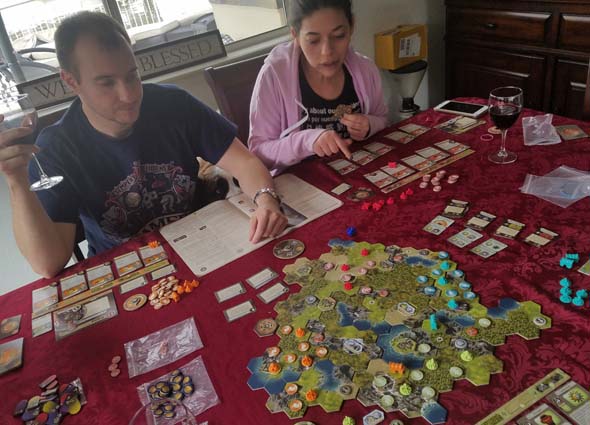
A New Dawn is a very elegant game.
A New Dawn addresses that problem by having each player take only a single action in each of their turns. There are no phases; just take an action from your focus bar and then move on to the next player. Turns, therefore, are very quick, turnaround time is very short, and the game moves along at a rapid pace. This, ironically, serves to better maintain the "one more turn" addictive nature of the computer game. You might find yourself neglecting bathroom breaks for several turns because things are moving along so swiftly. Your turn is generally quick enough that you want to finish it before you step away or take a break, and other players' turns are so quick that you don't want to step away because you know it'll be back around to your turn in a few minutes.
Longer games with longer turns and more downtime can also often result in players outright forgetting what they were planning on doing by the time the turn gets back around to them. Either that, or the large amounts of moves and actions that the other players take changes the game state so much that, when your turn comes around, the thing you were planning on doing is no longer ideal -- if it's even possible.
That's rarely a problem in A New Dawn because each player does one thing on their turn, so the state of the board isn't radically changing between your turns. It's much more of a gradual change. That doesn't mean that other players can't disrupt your plans; they certainly can, especially when combat between players starts happening. It just means that you aren't going to be sitting there bouncing up and down in your chair waiting to pull off a spectacular move, only to have another player blow up all your plans at the last minute and leave you spending far too long wondering "What the heck do I do now?" when your turn starts... [More]
67fd088c-265a-4a60-939d-4c4027df3179|0|.0
Tags:Sid Meier's Civilization, Sid Meier's Civilization: A New Dawn, Sid Meier's Civilization the Board Game, Fantasy Flight, Firaxis, 2K Games, board game, strategy, empire-building, focus bar, cities, world wonder, technology, culture, war, barbarians, James Kniffen
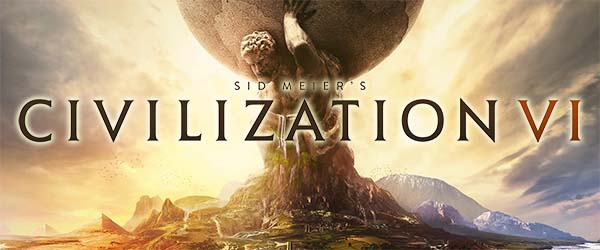
I really like Civilization VI! Of course, it has its share of nagging problems (some of which have been resolved already) - any game of this size and scope is likely to have issues at release. I've already been thinking of some ideas for how the game could be improved in expansions and DLC, and I'd like to spend a few posts to share some of those ideas with you now.
In my review of the game, I mentioned that oceans feel like they've regressed a bit since Beyond Earth: Rising Tide, in that they've returned to feeling like lifeless dead space on the map. Even though they're more important for Holy Sites and Campuses, mountains are also still mostly dead space on the map. They act as obstacles, and that's basically it. In expansions and DLC, I would like to see some of this space become more alive and useful. I'd like to spend this first suggestion post going over some ideas that I have for expanding the ocean mechanics, and for taking advantage of more of the map's dead space.
I have posted a link to this blog on Civfanatics at:
https://forums.civfanatics.com/threads/using-more-of-the-dead-space-in-the-map.610171/.
Feel free to discuss through the comments on this post, or via the linked forum topic!
Improve coastal cities
I'm very underwhelmed with coastal cities right now. Water tiles have very little utility. They provide small yield, can't have districts (other than a single harbor per city), and generally lack production. Coastal cities with lots of water are, thus, very unproductive and not really worth building. I think there's a couple ways to resolve this.
Harbors could provide a small amount of production. Or perhaps Harbors could act similarly to lighthouses from Civ V and provide production on sea resources. Or they could provide production on all adjacent sea tiles (so that placement is still important, and more of those empty sea tiles become useful and worth working, and you actually have to work them in order to get the benefit (as opposed to the Harbor just having an adjacency bonus). If we want to only use adjacency bonuses, then another alternative might be for Harbors to provide +1 production per adjacent coastal resource and +0.5 gold per adjacent water tile. That way, even cities that don't have clustered water resources can still have valuable locations for harbors.
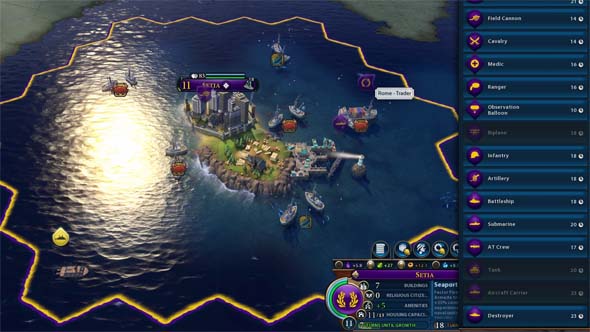
Coastal and island cities lack production and have limited space to build districts.
Another way to improve coastal cities would be to have some more early policies that benefit coastal cities. Perhaps the Maritime Industries policy could be changed to "+1 production in coastal cities, and +1 production from Harbors". Alternatively, Maritime Industries could be similar to the Veterancy policy, and it could provide "+33% production towards Harbor districts and buildings for that district". Or we could have policies that do both! A new policy could be added that provides the bonus production for early naval units. Maybe there can even be a whole extra early-game civic (maybe called "Seafaring" or "Way-finding") that has some policies and buffs towards coastal and island civilizations.
The lack of production for coastal cities could also be offset by giving them more gold and/or food for growth (in order to support a specialist economy)... [More]
0a6b7d05-286b-42c2-b6f9-dbbeca807f1a|1|5.0
Tags:Sid Meier's Civilization, Civilization VI, civilization, strategy, map, ocean, coast, beach, boardwalk, fishery, wind farm, island, mountain, observatory, astronomy, ski resort, tourism, tunnel, canal, navy, cities, Polynesia, way-finding, national park, naturalist, Civilization: Beyond Earth: Rising Tide
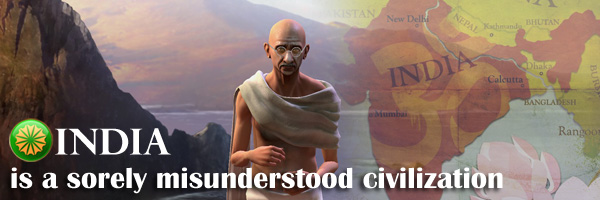
Continuing my series of strategies for Brave New World, I am going to take a moment to discuss one of (if not the) most sorely misunderstood civilizations from the vanilla game: Gandhi's India. India received a very minor tweak in Brave New World (its unique building was modified to provide tourism instead of gold), but the new trade route mechanics radically change the way that India should be played. In some ways, the new features make India feel like a completely new civilization!
The ancient civilization of India is one of the world's most populace and diverse countries. More than 1/6th of the world's population currently calls India home (that's over a billion people!), it is one of the cultural and spiritual centers of the world. India is the birthplace of both the Hindu and Buddhist religions, which make up third and fourth most populous religions today. The less-populous faith of Jainism also has roots in India. In addition to the variety of religions, there are also over 100 distinct languages that are spoken in India! Indian society used to follow a rigid caste system in which a person's status in life is determined at birth. Although this caste system is not enforced (and is actively discouraged by the government), it remains a persistent force in the nation, and still leads to a great deal of prejudice and conflict within the country.
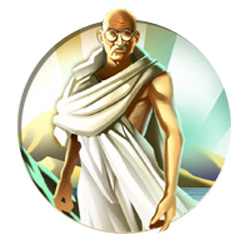
One of the most significant leaders of Indian history (and world history) is Mohandas Gandhi. In the early 1900's, India was under British occupation, and Gandhi, the son of the Prime Minister of the small state of Porbandar, was successful in leading an unprecedented non-violent rebellion to drive the foreign rule out. This peaceful rebellion lead to Gandhi being recognized as one of the most courageous and moral leaders the world has ever known. Indians affectionately refer to him as "Bapu" (translation: "father") in recognition of his role in creating the modern Indian nation. His birthday, October 2, is a national holiday in India, and is celebrated outside of India as the International Day of Non-Violence. Sadly, he was assassinated in 1948 (at age 78) by a Hindu nationalist who believed that Gandhi showed too much favoritism to Pakistan, one of India's bitter rivals. The assassin was tried and executed the following year, and Gandhi's ashes were distributed around the country for numerous memorial services.
Gandhi's representation in Civilization V gets a lot of undeserved criticism from some players, who often cite India as the "worst civ in the game" based solely on the fact that he is the only civ with a penalty explicitly stated in his unique ability (except for Venice in Brave New World), and that his unique unit is in some ways inferior to the unit it replaces. However, it is important to note right off the bat that there are plenty of civs who receive indirect penalties as part of their uniques. But the "Population Growth" ability, itself, is very poorly understood. Many players assume that this means that India must be played with a small empire, and that India cannot compete for any victory except for culture or diplomatic. This is simply not the case, and I'm going to explain why! [More]
53e37110-4392-460c-901d-be3ce7603441|9|4.9
Tags:Sid Meier's Civilization, Civilization V: Brave New World, Civilization V, Gandhi, India, Population Growth, War Elephant, Mughal Fort, tourism, trade route, chariot archer, castle, happiness, unhappiness, cities, PolyCast, atomic bomb, nuclear missile, nukes, ranged mounted unit, Civ-V
|

| 12 | | | | | | | 60 | | 11 | | | | | | | 55 | | 10 | | | | | | | 50 | | 09 | | | | | | | 45 | | 08 | | | | | | | 40 | | 07 | | | | | | | 35 | | 06 | | | | | | | 30 | | 05 | | | | | | | 25 | | 04 | | | | | | | 20 | | 03 | | | | | | | 15 | | 02 | | | | | | | 10 | | 01 | | | | | | | 05 |
|